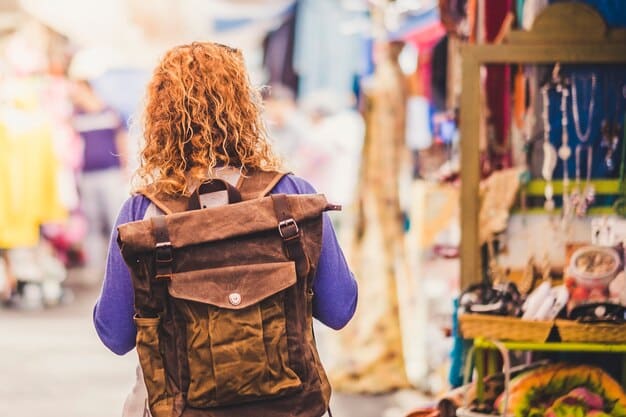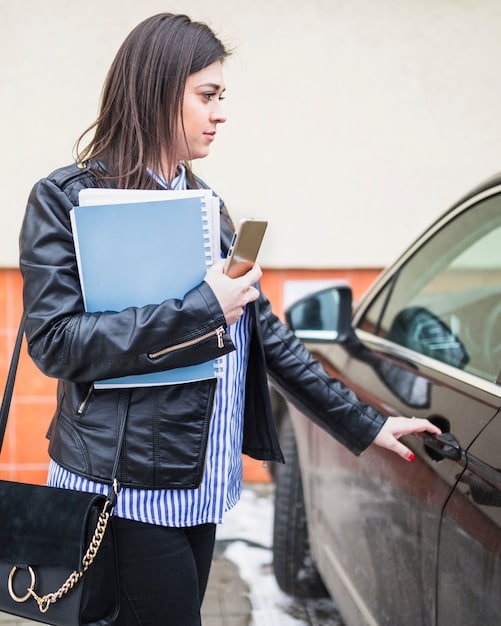Travel Safety for Women: Expert Tips for a Secure Trip

Travel safety for women is a crucial aspect of planning any trip, requiring awareness, preparation, and proactive measures to ensure a secure and enjoyable experience, whether traveling solo or in a group.
Traveling as a woman comes with unique safety considerations. This guide, Travel Safety for Women: Expert Tips for a Secure and Enjoyable Trip, helps you navigate the world with confidence.
Planning Your Trip: Safety First
Before you even pack your bags, meticulous planning is your first line of defense. Research your destination thoroughly and understand the local customs, laws, and potential risks.
Research is more than just finding the best restaurants; it’s about understanding the environment you’ll be in.
Destination Research
Knowing the potential risks and cultural norms is crucial for staying safe.
- Research common scams targeting tourists.
- Understand local laws and customs.
- Identify safe and unsafe areas in your destination.
Accommodation Safety
Choose accommodations wisely to ensure your personal safety and security.
- Read reviews to gauge the safety and security of the hotel or rental.
- Opt for reputable hotels or rentals with security features like 24-hour front desk.
- Ensure the accommodation has secure locks and window coverings.

Planning your trip considering the security will provide you a better experience and avoiding risk situations.
Essential Travel Gear for Women’s Safety
The right gear can significantly enhance your safety and peace of mind while traveling. From personal alarms to secure bags, having the right tools can make a big difference.
Knowing what to pack can protect you in moments of riskness.
Personal Safety Devices
Equipping yourself with personal safety devices can provide an extra layer of security.
- Carry a personal alarm to deter potential attackers and alert others.
- Consider a small, bright flashlight for navigating dark areas.
- A whistle can be used to attract attention in emergency situations.
Secure Travel Bags
Protecting your belongings is crucial to prevent theft and potential identity compromise.
- Use a cross-body bag or backpack with anti-theft features.
- Consider bags with RFID-blocking technology to protect against electronic theft.
- Keep valuables out of sight and reach of potential thieves.
Investing in travel gear that prioritizes security will allow you to take more advantage of your trip.
Staying Safe in Transit
Transportation hubs like airports, train stations, and bus terminals can be hotspots for scams and theft. Be vigilant and proactive in protecting yourself and your belongings during transit.
Never let your guard down when you are in transit environments.

Navigating Airports and Stations
Airports and stations can be chaotic, making it easier for criminals to target unsuspecting travelers.
- Arrive early to avoid rushing and stay alert.
- Keep your luggage close and never leave it unattended.
- Be wary of strangers offering assistance with your luggage.
Safe Transportation Choices
Choosing safe methods of transportation is essential for your well-being.
- Use reputable taxi or ride-sharing services.
- Avoid walking alone at night in unfamiliar areas.
- Share your ride details with a trusted contact.
Staying safe in transit means to be proactive and to be aware of your surroundings.
Using Technology to Enhance Your Safety
In today’s digital age, technology offers many tools to enhance travel safety. From tracking apps to emergency contacts, using your smartphone wisely can provide an added layer of security.
Smartphones are very important in terms of safety, and should be used in benefit of that matter.
Safety Apps
Many apps can provide real-time tracking and emergency assistance.
- Install a personal safety app that allows you to send alerts to emergency contacts.
- Use GPS tracking apps to share your location with trusted contacts.
- Explore apps that provide local emergency numbers and information.
Staying Connected
Maintaining communication with friends and family can provide peace of mind and support.
- Share your itinerary with a trusted contact.
- Check in regularly with friends and family.
- Use social media to share your location and update your status.
Take advantage of many tools that this new era present us to add safety to your trips.
Emergency Preparedness: Knowing What to Do
Despite the best planning, emergencies can still occur. Knowing how to respond in a crisis is crucial for minimizing harm and getting help quickly.
Being ready for any kind of emergency is important when traveling.
Creating an Emergency Plan
Having a plan in place can help you react quickly and effectively in a crisis.
- Identify local emergency numbers and keep them readily accessible.
- Know the location of the nearest embassy or consulate.
- Keep copies of important documents in a secure location.
Handling Difficult Situations
Being aware of how to handle common emergency situations can make a big difference.
- Stay calm and assess the situation before reacting.
- Trust your instincts and remove yourself from uncomfortable situations.
- Seek help from local authorities or trusted individuals.
Knowing how to respond in emergency situations is crucial for travel safety.
Maintaining Awareness: Trusting Your Instincts
One of the most powerful tools for staying safe is your intuition. Paying attention to your surroundings and trusting your instincts can help you avoid potentially dangerous situations.
Is essential to pay attention and trust your feelings.
Recognizing Red Flags
Being able to identify potential threats is crucial.
- Be wary of individuals who approach you with overly friendly or persistent behavior.
- Avoid areas that appear deserted or poorly lit, especially at night.
- Trust your gut feeling and remove yourself from situations that feel unsafe.
Assertive Communication
Communicating assertively can deter potential troublemakers.
- Maintain eye contact and speak confidently.
- Clearly state your boundaries and refuse unwanted advances.
- Use a firm tone to communicate your intentions.
Is important to be aware of your surroundings and to trust your instincts. These precautions will protect you in your travels.
| Key Point | Brief Description |
|---|---|
| 🗺️ Plan Ahead | Research your destination and understand local customs and laws. |
| 🎒 Essential Gear | Carry personal safety devices and secure travel bags to protect yourself. |
| 📱 Use Tech Wisely | Utilize safety apps and stay connected with trusted contacts for support. |
| 🚨 Emergency Ready | Create an emergency plan and know how to handle difficult situations effectively. |
FAQ
▼
Before your trip, research local customs, laws, and potential risks. Identify safe and unsafe areas in your destination and note emergency contact details.
▼
Carry a personal alarm, a small flashlight, and a whistle. These items can help deter attackers and attract attention in emergency situations. Also keep a fully charged cell phone.
▼
Install personal safety apps that allow you to send alerts to emergency contacts and share your location. Maintain regular communication with friends and family throughout your trip.
▼
Identify local emergency numbers, know the location of the nearest embassy, and keep copies of important documents in a secure location. Also, inform someone of your travel plans.
▼
Be wary of overly friendly strangers and avoid poorly lit areas at night. Trust your gut feeling and communicate assertively to set boundaries and refuse unwanted advances to enhance your safety.
Conclusion
Prioritizing travel safety for women involves a combination of planning, preparation, and awareness. By following these expert tips and trusting your instincts, you can ensure a more secure and enjoyable travel experience, no matter where your adventures take you.





